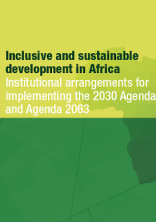Inclusive and sustainable development in Africa

Translating both the global and regional development frameworks adopted by member States in 2015 into concrete outputs and outcomes will require strong institutional capacities for planning, coordination and follow up. The present report examines the role of institutional arrangements in the implementation of development frameworks.
Institutions consist of a set of customs, norms and social routines as well as formal and informal rules and regulations agreed by communities and societies to regulate human behaviour, individually, in the community and outside of the community.
To the extent that institutions provide a formal and informal framework for societal engagement in political and socioeconomic development, they have profound implications for patterns of growth and distribution of rewards, with implications for inequality and poverty eradication. In that context, a country’s institutional culture can exert considerable influence on its capacity to implement development initiatives, such as the 2030 Agenda for Sustainable Development and Agenda 2063 on transforming Africa.